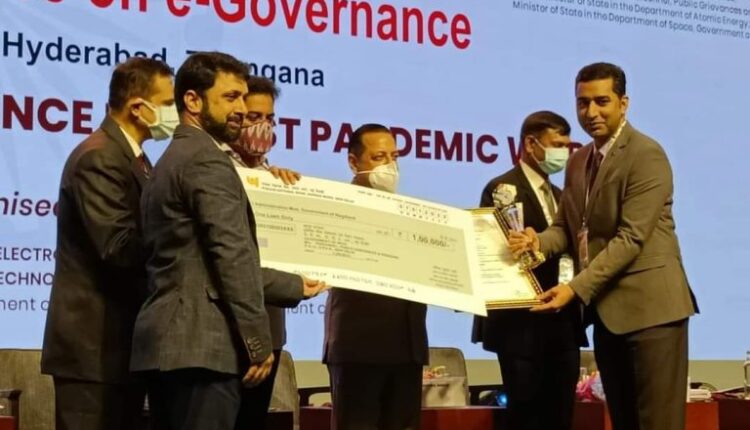Senior IAS officer from J&K Shahid Iqbal Choudhary has added another national award to his kitty, this time for his yeoman’s service in the fight against Covid and providing relief to lakhs of people in the Union Territory’s summer capital Srinagar
J&K IAS officer gets national award for IT-based Covid management project
Jammu, Jan 7: Senior IAS officer from Jammu and Kashmir Shahid Iqbal Choudhary has added another national award to his kitty, this time for his yeoman’s service in the fight against Covid and providing relief to lakhs of people in the Union Territory’s summer capital Srinagar.
During the 24th National Conference on e-governance at Hyderabad on Friday, the ‘Covid Call Centre and Management System’ project was selected for the ‘gold’ award for using information and communication technology in Covid management.
The award was presented by Minister of State in the Prime Minister’s Office and Personnel Ministry Jitendra Singh in the presence of Minister of State for Information Technology (IT) K T Rama Rao and other senior bureaucrats.
Choudhary, a 2009-batch IAS officer, is at present the tribal affairs department’s administrative secretary, chief executive officer of the JK Mission-Youth and mission director for the Skill Development Mission.
He has received many national awards over the past decade, including the Prime Minister’s Award for Excellence in Public Administration for outstanding contribution in 2014-15.
Quoting a communication from Union Under Secretary Vibhuti Panjiyar, informing Choudhary about his project being selected for the ‘gold’ award, officials said the category had the highest number of 231 nominations from several organisations and districts of the country.
The project, which was conceptualised by Choudhary along with his team member District Informatics Officer Mujtaba Ahmad Banday, saw 98.4 per cent of the over 12 lakh population of Srinagar district getting directly benefiting.
The IAS officer is also a recipient of National E-Governance Award 2015, national award by the Election Commission of India for outstanding achievement in conducting of the 2014 general elections with national level best practices recognition, national award for women empowerment, national award for exceptional achievement in girl child education, governance award and state election award.
Choudhary led from the front when the coronavirus started spreading in March 2020, with Srinagar, where he was then posted as district development commissioner, being the worst hit in Jammu and Kashmir.
The innovative measures taken by the administration not only helped in containment of the infection to a large extent but also provided succour to citizens, including migrant labourers, during the prolonged lockdown, the officials said.
They said Choudhary initiated a host of information technology (IT) driven measures under a coordinated project in the aftermath of the pandemic-induced lockdown which threw enormous challenges, like containment measures, contact tracing, quarantine management and effective communication.
These IT interventions helped the Srinagar district administration to cover ground from information dissemination to self-evaluation and contact tracing to complete quarantine management as well as public grievance redressal and ensuring essential service delivery, food and medicine reaching every household, the officials said.
The officials said the project was developed as a suite of multiple modules which included web-based applications for public and official use, mobile applications that were designed keeping in mind 2G internet connectivity in Srinagar in the wake of the August 5, 2019, development when the Centre abrogated Article 370 and bifurcated the erstwhile Jammu and Kashmir state into two union territories.
Implementation of GPS-based device and application for tracking and monitoring on real-time basis, interactive voice response system (IVRS) based contact centre for effective response to citizen queries and information propagation, were some of other highlights of the project, they said.
The officials said a mobile application was launched to monitor the location, movement and health of Covid positive cases, besides information was disseminated through bulk SMS, voice broadcast and social media to propagate information about measures to prevent COVID-19.
Highlighting the broader objectives of the project, the officials said the lockdown required measures to be put in place for running essential services; reaching out to patients, including over 12,000 pregnant women and 17,000 patients with chronic ailments; meeting special requirements of elderly and women, children, poor and destitute to ensure that regular needs of life and non-Covid healthcare are attended despite all constraints.
Establishment of an IVRS call centre was aimed to ensure this, while a Covid call centre as an one-stop solution for all requirements, and address grievances was also introduced, they said.
The officials said people travelling from affected countries as well as different cities of the country, hiding travel history, were traced using ‘Talash’ (search), an application which also included crowd sourcing of information apart from locating travel details and transactions.
The officials said Srinagar was divided into 25 zones to deliver ration, milk, vegetables, medicines and other essentials through IT based interventions at the residence of the citizens.
Geo-fencing and home-quarantine monitoring was another feature of the project which enabled the government to monitor the patients under quarantine through GPS Monitoring, the officials said.
They said a special initiative for patients suffering from cancer, chronic kidney disease and diabetes requiring frequent medical consultations, therapies and treatment including dialysis was ensured through online registration for end to end assistance during lockdown.
The officials said the pro-active approach of the district administration and timely launch of the applications generated a sentiment of “positivity and trust” in the general public in the government.
The database generated for more than 12 lakh population served as an online repository for testing, screening, contact tracing and later on in the vaccination drive, they said. (Agencies)

